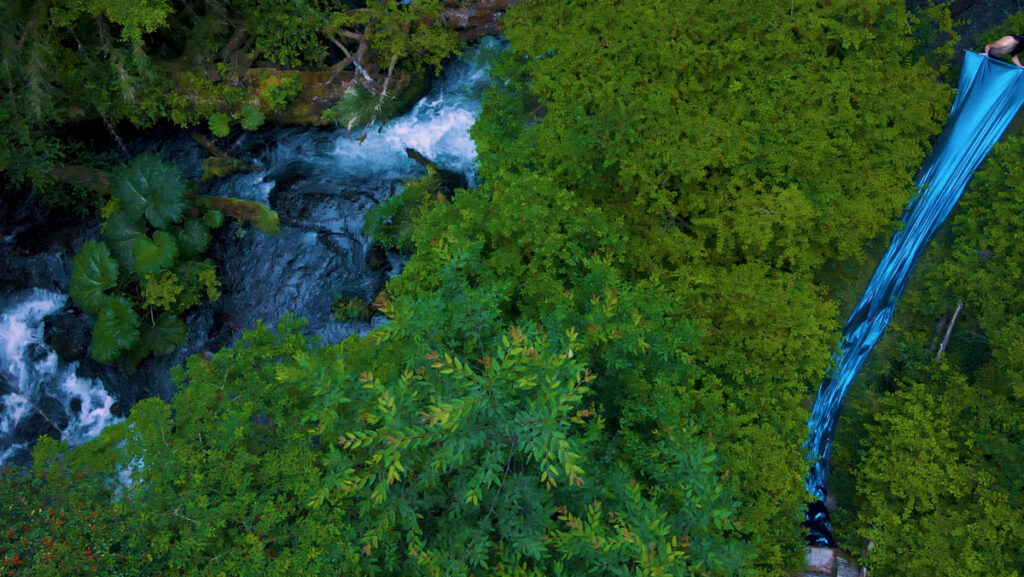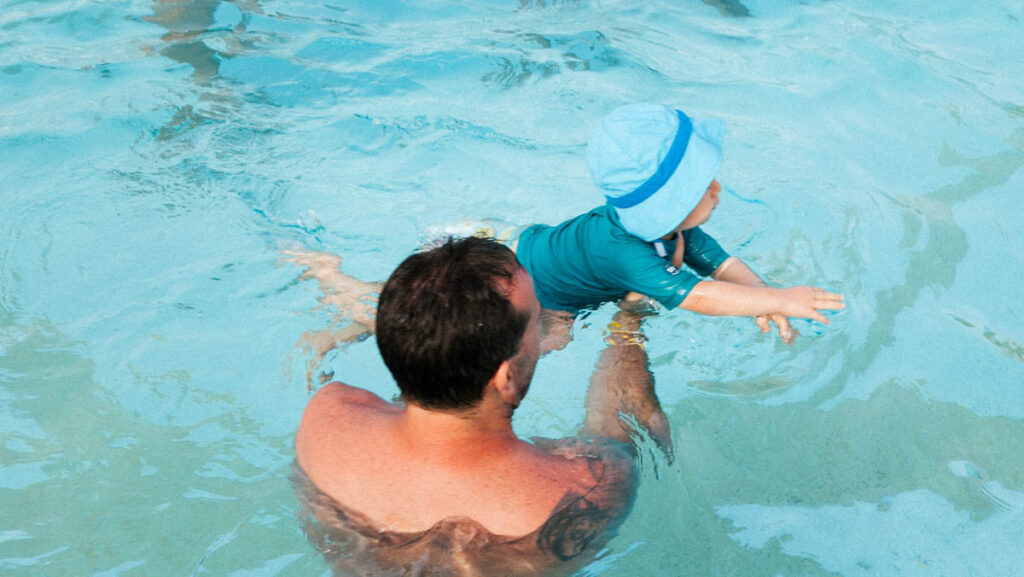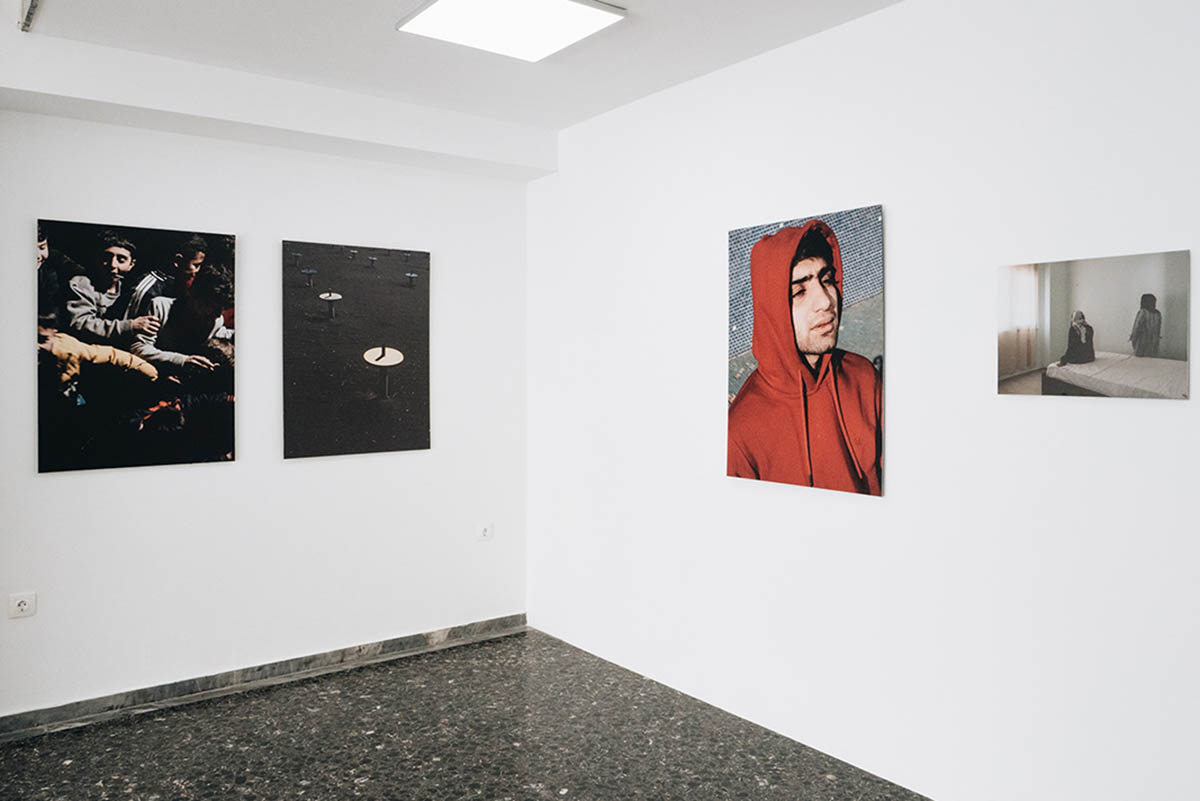
Ilir Tsouko is a visual storyteller who primarily works in the genre of documentary photography. His long-term projects and series often revolve around migration, social and political issues. His photographs stand out not only for the stories they tell but for how they tell them: aiming to go beyond the specifics of What, Who and Where they rather direct our attention on the human condition. One of Tsouko’s recent projects is „Life in Limbo“ which features a selection of photographs taken from a larger series created between 2021 and 2022 in a beach resort in Albania. The photographs in the exhibition show children playing, adults staring outside large windows in expectation, yellow beach chairs, dark sand and water in different blue shades. The surroundings are comfortable and soothing, but the horizon is almost always missing, while the Statue of Liberty stands freely, surrounded by a cloudy afternoon sky.
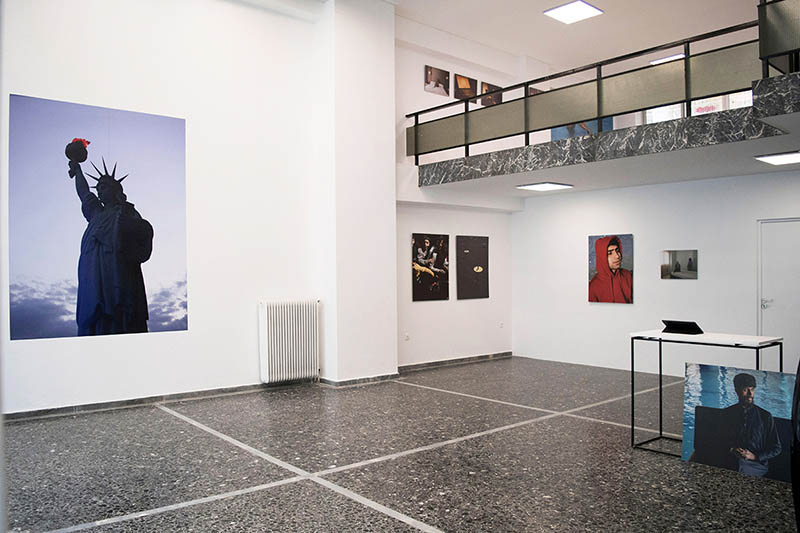
The copy of the Statue of Liberty is part of the beach resort Rafaelo located in the small town of Shëngjin on the Adriatic coast in Albania. In August 2021 Albania agreed to take Afghan refugees and 1870 of them were hosted at the beach resort. Most of them former government officials and employees of American institutions were evacuated expecting to resettle in the U.S. and ended up in a country they had never heard of. Most of the refugees had never seen the sea before and now they were living in a catered luxury resort, trapped in a never ending vacation dominated by feelings of gratitude for having escaped the revenge of Taliban’s and frustration for the undetermined future of their relocation in the US. The Rafaelo hotel in Albania provided accommodation for Afghans who were brought to Albania by various American non-profit organizations (including Vital Voices, founded by Hillary Clinton, the National Endowment for Democracy, the U.S. military-allied Spirit of America, and FIFA) and affiliates. Rafaelo signed agreements with the US organizations who were covering the costs for room and board. By December 2022, more than 1,700 Afghans had occupied 485 out of 657 rooms in the hotel, creating a community of their own. The first months went by peacefully while children enjoyed playing soccer, families took walks on the boardwalk, and shopped for groceries in nearby Lezhë.
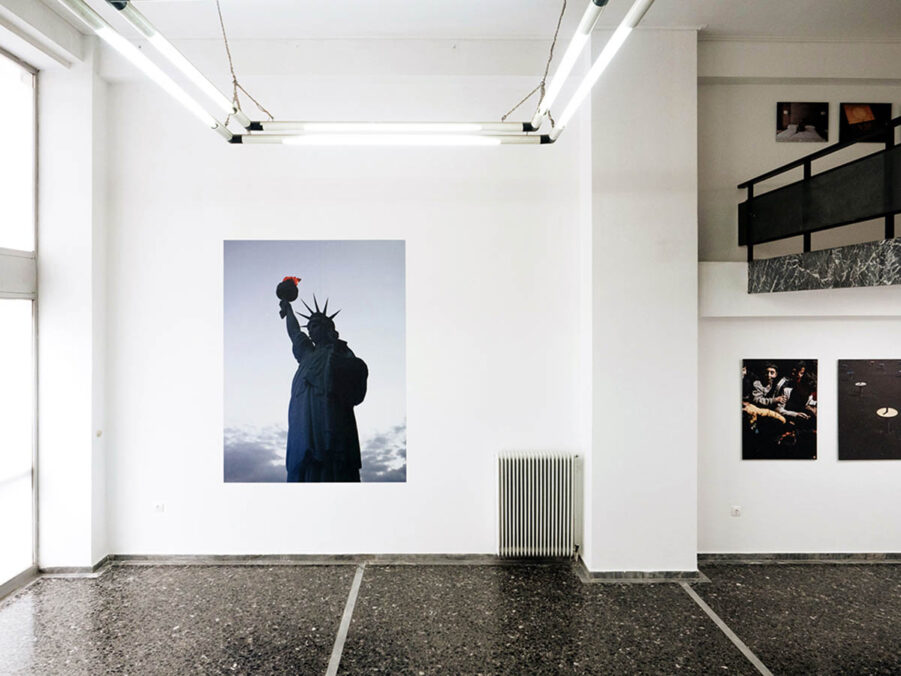
„Life in Limbo“, Exhibition view at space52. Photo: Olympianna Miliaki & Ilir Tsouko 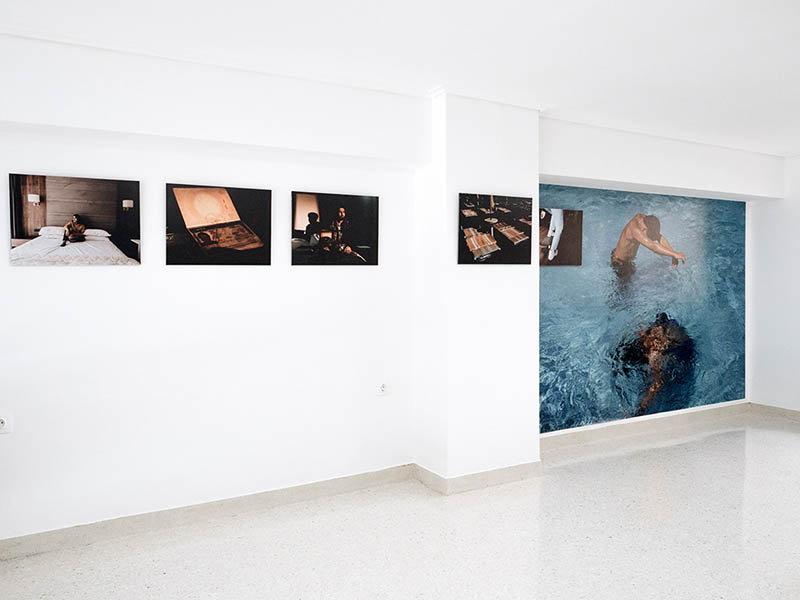
„Life in Limbo“, Exhibition view at space52. Photo: Olympianna Miliaki & Ilir Tsouko
Nevertheless, without concrete information about what the future would bring and fearing to have been left behind, soon the tiredness and frustration of waiting started to rise. Some however tried to give meaning to this period. A young evacuee started instructing children on how to skateboard. Meanwhile, a team of artists were busy creating murals while teachers organized classes for both evacuee children and adults. Additionally, a handful of culinary entrepreneurs set up shop in the town and began selling their prepared food.
Tsouko visited the resort on several occasions and spent a lot of time getting to know the people and each of their stories personally. His connection with the refugees allowed him to capture intimate photographs that, together with their stories, create a narrative with multiple perspectives. In October and November 2021 Ilir visited Afghanistan with an assignment to photograph and document how the life and rights of women had changed after the return to power of the Taliban. In December 2021, the US State Department provided an update, announcing that individuals who had departed Afghanistan on a charter flight prior to August 31st and were currently residing in Albania or other countries would be considered for inclusion in Operation Allies Welcome, making them eligible for resettlement in the United States. Finally, some good news for the refugees at Rafelo.
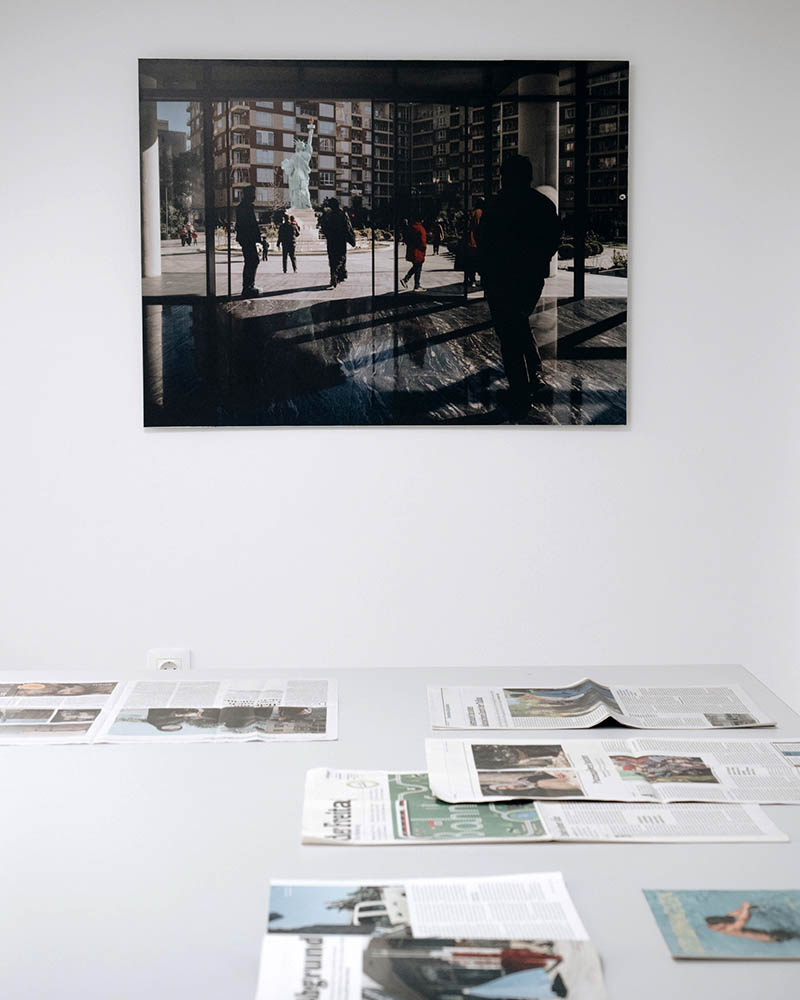
Upon Ilir’s return to Rafaelo in Spring 2022 some of the refugees he had personally known, had already left and now they were writing to him via WhatsApp from US or Canada. The majority of those who left Rafaelo had settled in Canada who offered a faster option to obtain permanent resettlement.
Today around 700 of them are still waiting in the hotel for their cases to be processed and some of them might have to stay in Albania.
“Life in Limbo” is the attempt to capture the different states of uncertainty, struggles, hopes and aspirations. Common experiences for refugees who have been forced to flee their home countries due to conflict, persecution, or other forms of violence, in the process of a long and difficult journey of resettlement. In the hope to find refuge in the United States, thousands of evacuees who fled the country on chartered flights landed in other countries, such as the United Arab Emirates, Iraq, Mexico, Uzbekistan and Greece.
In a panel discussion at Space 52, as part of the public program of the exhibition, intellectuals from Afghanistan in conversation with journalist Silke Weber and Ilir Tsouko shared their stories about fleeing Afghanistan to Greece and their experiences of living in exile. Homa Ahmadi, who had previously held three mandates as a member of the Afghan parliament, escaped to Greece via Iran and Georgia with the aid of international organizations and Melissa Network. Along with 25 other parliamentarians, she arrived in Greece 19 months ago. While 16 of them have been resettled in the United States, Homa Ahmadi and five others are currently residing in refugee camps in Athens and Thessaloniki, awaiting the processing of their cases.
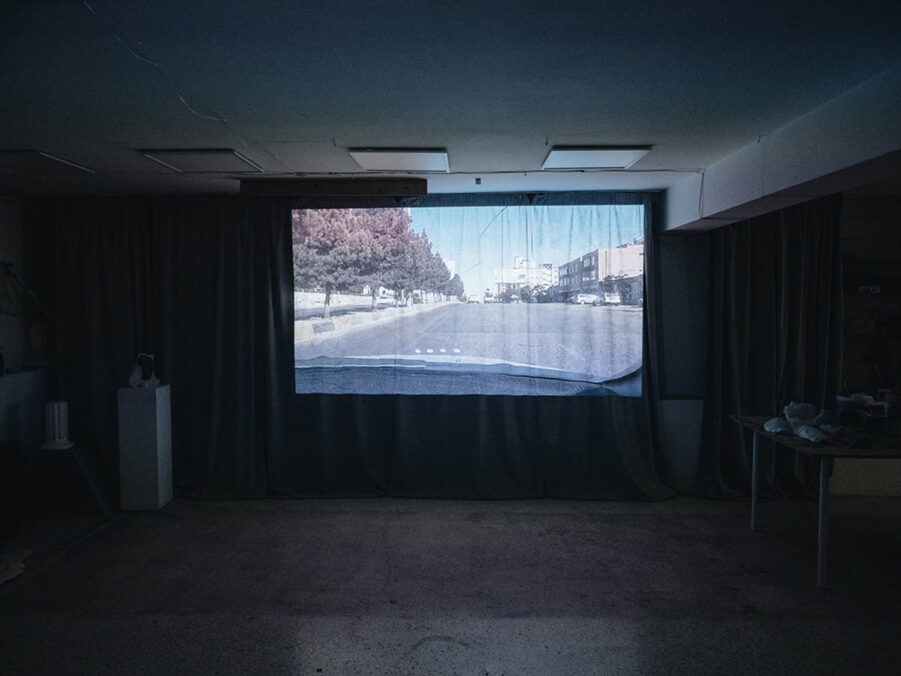
After serving as a judge for six years, Hasina Haidari was compelled to flee when the Taliban seized control. Her life was at risk due to her involvement in cases related to the Taliban’s offenses against tourists and journalists. She has been residing in Athens for 17 months while awaiting the processing of her resettlement case. Parwin Hamkar, a former prosecutor with 30 years of experience, fled Afghanistan along with 400 colleagues with the assistance of the International Bar Association. As of January 2021, their cases were transferred to Canadian Immigration, and most of the individuals in the group have been relocated to Canada. However, her family and two other families from the group are still in Greece, awaiting the processing of their cases. Parwin Hamkar currently resides in a refugee camp, and for the past three months, the financial support they had been receiving from the Greek government has ceased. While they are grateful for the support they have received thus far, they continue to live in a state of constant worry and limbo.
Melissa, a network for migrant and refugee women living in Greece, has provided support to all three of them and their families. They frequently visit the Melissa Center to engage with other refugees, participate in activities and discussions, and enroll their children in language courses. They, along with other exiled intellectuals, have founded the „Afghan Leader and Parliamentary Network,“ a registered organization in both Greece and Canada. Their aim is to create a community that will continue to participate in politics and decision-making processes, and fight for women’s rights in Afghanistan. The discussion concluded by noting the crucial role that exhibitions and media can play in supporting refugees by raising awareness, giving voice, holding authorities accountable, facilitating connections, and providing practical resources.
Many visitors attended the opening and panel discussion, and the Greek and Albanian media expressed significant interest in the project. These events demonstrated how exhibitions can provide a platform by creating a space for expression, inclusion, challenging stereotypes, raising awareness, building connections, and providing practical support. In the exhibition “Life in Limbo” photographs from Albania are contrasted by images and unedited video footage taken by Ilir and his translator Hameed Farhadi during his visit in Afghanistan in 2021 after the return of Taliban’s into power.
Exhibition: „Life in Limbo“, Ilir Tsouko
Exhibition duration: 01.04 – 29.04.2023
Ilir Tsouko was born in Albania (1990) and grew up in Athens, Greece. He is actually based in Berlin and Tirana. He studied Photojournalism & Documentary Photography at Hochschule Hannover – University of Applied Sciences and Arts. During this period, he has been working for the Magnum Photographers Enri Canaj and Chien-Chi Chang. Before that, he finished his MSc in Health Sciences at CNAM University-Paris/Athens. Tsouko’s work has been published by notable publications such as DIE ZEIT MAGAZIN, The Washington Post, The Guardian, NZZ, ArteTV, Republik, Deutschlandfunk, Ö1, Kathimerini and other mostly European Magazines and Newspapers. Ilir Tsouko is together with Enri Canaj the founder of the Albanian Center of Photography. Ilir’s work has been exhibited at Helsinki Photo Festival, NZZ Bellevue Zürich, 9. f/stop – Festival für Fotografie Leipzig and Humble Arts Foundation, New York City. He has won the IJ4EU- Investigative Journalism for Europe in 2021.
Adela Demetja is a curator born in 1984 Tirana, Albania living between Frankfurt am Main and Tirana. Demetja studied Painting from 2002 to 2006 at Academy of Art in Tirana. She holds a master degree in “Curating and Art Criticism” from Städelschule and Goethe University in Frankfurt/Main. She is the founding-director of Tirana Art Lab – Center for Contemporary Art, which she established in 2010. As an independent curator she has curated numerous international exhibitions and collaborated among others with institutions like Institute for the History of Frankfurt, National Gallery of Arts Tirana, Maxim Gorki Theatre Berlin, Institute of Contemporary Art in Portland, OR, USA, Action Field Kodra Thessaloniki, Villa Romana Florence, Haus am Lützowplatz Berlin, Lothringer 13 Städtische Kunsthalle Munich, etc. She curated the Albanian Pavilion at 59th Venice Biennale represented by Lumturi Blloshmi.
space52 is a contemporary artist-run space founded in 2017 by the artist Dionisis Christofilogiannis located in Athens, Greece. The space times to embrace and support the practices of artists through an annual program of art exhibitions, publications, screenings, artist workshops and artist residencies. They work with a growing network of artists, guest curators and partnering institutions on long term collaborative programs with a focus on new ways of experiencing and producing contemporary art. Through the online journal One After Another they publish original research and art criticism in the form of reviews, interviews, and essays on local and international artists and exhibitions.
*Some of the photographs from the exhibition have been published in the Washington Post and Die Zeit Magazine. The exhibition is supported by Heinrich-Böll Foundation Thessaloniki. The Panel Discussion is supported by the Friedrich Ebert Foundation Athens.



